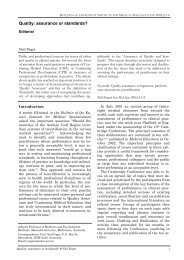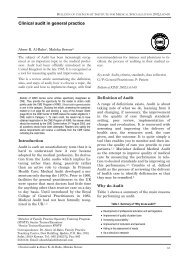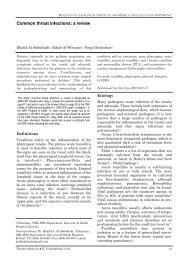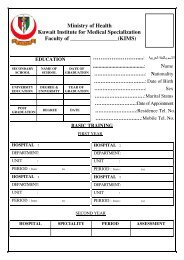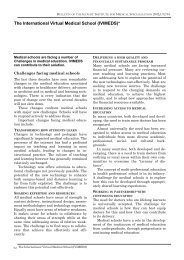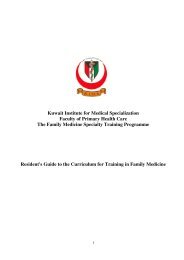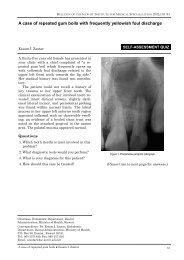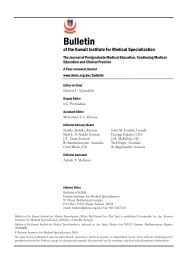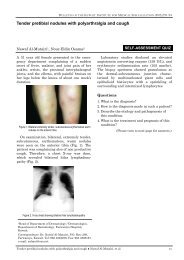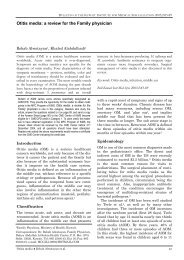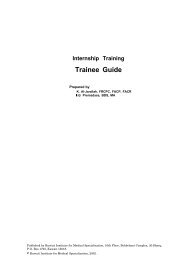The immunology of unexplained recurrent spontaneous abortion
The immunology of unexplained recurrent spontaneous abortion
The immunology of unexplained recurrent spontaneous abortion
- No tags were found...
Create successful ePaper yourself
Turn your PDF publications into a flip-book with our unique Google optimized e-Paper software.
BULLETIN OF THE KUWAIT INSTITUTE FOR MEDICAL SPECIALIZATION 2003;2:32-38<br />
Cytokines and <strong>unexplained</strong> <strong>recurrent</strong> <strong>spontaneous</strong> <strong>abortion</strong> ● Raj Raghupathy
BULLETIN OF THE KUWAIT INSTITUTE FOR MEDICAL SPECIALIZATION 2003;2:32-38<br />
<strong>The</strong> <strong>immunology</strong> <strong>of</strong> <strong>unexplained</strong> <strong>recurrent</strong> <strong>spontaneous</strong> <strong>abortion</strong>:<br />
cytokines as key mediators<br />
Raj Raghupathy<br />
Spontaneous <strong>abortion</strong> is one <strong>of</strong> the most common<br />
complications <strong>of</strong> pregnancy. Recurrent <strong>spontaneous</strong><br />
<strong>abortion</strong> (RSA), defined as the occurrence <strong>of</strong> three<br />
consecutive <strong>abortion</strong>s, occurs due to several identifiable<br />
causes such as anatomic, genetic, endocrinologic<br />
and infectious etiologies, but a substantial<br />
proportion <strong>of</strong> RSA, up to 50-60%, are due to <strong>unexplained</strong><br />
or unknown etiologies. Of the various humoral<br />
immune etiologies that have been investigated,<br />
only anti-phospholipid antibodies have been<br />
confirmed as being etiologic factors, but that too, in<br />
a small proportion <strong>of</strong> the cases <strong>of</strong> RSA. Cellular immune<br />
effectors and cytokines have been the focus<br />
<strong>of</strong> intense investigation recently, and it appears that<br />
certain cytokines may be beneficial to pregnancy,<br />
while some are actually antagonistic to pregnancy.<br />
This article reviews recent observations on the association<br />
between cytokines and <strong>unexplained</strong> <strong>recurrent</strong><br />
<strong>spontaneous</strong> <strong>abortion</strong>.<br />
Evidence from studies on murine and human<br />
pregnancy points to a strong association between<br />
maternal Th2-type immunity and successful pregnancy<br />
on the one hand and between Th1-type immune<br />
reactivity and pregnancy loss on the other.<br />
While there is a paucity <strong>of</strong> data from human pregnancy<br />
indicating that Th1-type immune effectors<br />
actually lead to pregnancy, it is difficult to ignore the<br />
compelling evidence linking inappropriate Th1-type<br />
immunity to pregnancy loss. Th2-type immunity<br />
may play protective roles during pregnancy, hence<br />
the nexus between a Th2 shift and successful pregnancy.<br />
This article examines these associations and<br />
discusses possible mechanisms underlying immunologically-mediated<br />
pregnancy failure.<br />
Key words: Recurrent <strong>spontaneous</strong> <strong>abortion</strong>, cytokines,<br />
pregnancy loss<br />
Bull Kuwait Inst Med Spec 2003;2:32-38<br />
Bulletin <strong>of</strong> KIMS carries some articles specifically designated as<br />
CME/CPD. <strong>The</strong>y provide the opportunity for the reader to obtain<br />
credit points in the MPC Program <strong>of</strong> KIMS. <strong>The</strong> <strong>immunology</strong> <strong>of</strong> <strong>unexplained</strong><br />
<strong>recurrent</strong> <strong>spontaneous</strong> <strong>abortion</strong>: cytokines as key mediators<br />
is one in this category. Studying the article, answering the questions<br />
related to it on page 38, and sending a copy <strong>of</strong> the Answer Sheet<br />
(page 50) to the CME Center <strong>of</strong> KIMS makes the reader eligible for 1<br />
CME/CPD credit in Category 1. To claim credit, the reader has to<br />
have obtained registration in the MPC Program <strong>of</strong> KIMS, the answer<br />
sheet should be received by the CME Center before 31 st May 2004,<br />
and all questions should have been attempted. Readers who satisfy<br />
the above requirements would receive a certificate from the CME<br />
Center indicating the credit data.<br />
Introduction<br />
Pregnancy is not nearly as successful as one<br />
might think; fetal viability is not achieved in<br />
approximately 70% <strong>of</strong> human conceptions and<br />
an estimated 50% are lost prior to the first<br />
missed menses. 1 In fact, the actual rate <strong>of</strong><br />
early pregnancy loss after implantation may<br />
Department <strong>of</strong> Microbiology, Faculty <strong>of</strong> Medicine, Kuwait<br />
University, Kuwait.<br />
Correspondence: Pr<strong>of</strong>. Raj Raghupathy, Department <strong>of</strong><br />
Microbiology, Faculty <strong>of</strong> Medicine, Kuwait University,<br />
P.O. Box 24923, Safat 13110, Kuwait.<br />
Fax: 965 5332719; Email: raj@hsc.kuniv.edu.kw<br />
exceed the number <strong>of</strong> recognized pregnancies,<br />
and may be as high as 31%. Spontaneous<br />
<strong>abortion</strong>, defined as a clinically detectable<br />
pregnancy loss prior to 20 weeks <strong>of</strong> gestation,<br />
occurs at a frequency <strong>of</strong> 15% to 25%. Spontaneous<br />
<strong>abortion</strong> is one <strong>of</strong> the most common<br />
complications <strong>of</strong> pregnancy, with approximately<br />
one in every four pregnant women undergoing<br />
one or more pregnancy losses. 2 For<br />
most women, <strong>spontaneous</strong> <strong>abortion</strong> is a random<br />
event, but some women have three or<br />
more consecutive <strong>abortion</strong>s, and these women<br />
are recognized as having <strong>recurrent</strong> <strong>spontaneous</strong><br />
<strong>abortion</strong> (RSA), defined as the occurrence<br />
<strong>of</strong> 3 or more clinically detectable pregnancy<br />
losses before the 20 th week <strong>of</strong> gestation. Causation<br />
is usually sought after two consecutive<br />
pregnancy losses, especially for couples without<br />
a successful pregnancy where fetal heart<br />
activity has been identified, in couples where<br />
the woman is older than 35 years <strong>of</strong> age, and<br />
in couples having difficulty conceiving.<br />
32<br />
Cytokines and <strong>unexplained</strong> <strong>recurrent</strong> <strong>spontaneous</strong> <strong>abortion</strong> ● Raj Raghupathy
BULLETIN OF THE KUWAIT INSTITUTE FOR MEDICAL SPECIALIZATION 2003;2:32-38<br />
Etiologies <strong>of</strong> Recurrent Spontaneous<br />
Abortion<br />
<strong>The</strong> search for etiologies <strong>of</strong> RSA have led to<br />
the current estimates (Table 1) <strong>of</strong> the proportion<br />
<strong>of</strong> RSA caused by chromosomal anomalies,<br />
3 endocrinologic abnormalities, 4 infectious<br />
5 and anatomic 6 problems, and by humoral<br />
anti-phospholipid antibodies. 7<br />
Table 1. Etiology <strong>of</strong> Recurrent Spontaneous Abortion<br />
Factor Incidence (%)<br />
Endocrine 17<br />
Anatomic 10<br />
Genetic 5<br />
Infectious 5<br />
Anti-phospholipid antibodies 3<br />
Unknown etiology 60<br />
As can be seen in Table 1, the currently<br />
well-established mechanisms together account<br />
for only about 40% <strong>of</strong> the cases <strong>of</strong> RSA,<br />
with a substantial proportion <strong>of</strong> cases classified<br />
as “unknown” or “<strong>unexplained</strong>”. 8 <strong>The</strong> existence<br />
<strong>of</strong> such a large proportion <strong>of</strong> cases<br />
with unidentified etiologies has in part fuelled<br />
great interest in the investigation <strong>of</strong><br />
possible immunologic etiologies <strong>of</strong> pregnancy<br />
failure.<br />
At least three lines <strong>of</strong> evidence suggest that<br />
immunologic causes may account for a proportion<br />
<strong>of</strong> the previously <strong>unexplained</strong> pregnancy<br />
losses. One is the impressive capacity<br />
<strong>of</strong> the immune system to effect various deleterious<br />
reactions such as allograft rejection,<br />
hypersensitivity and autoimmune tissue<br />
damage. Secondly, female reproductive tissues<br />
are immunologically dynamic; just as<br />
the immune system interacts dynamically<br />
with other systems in the body, bi-directional<br />
‘cross-talk’ occurs between the immune system<br />
and the reproductive system during<br />
pregnancy. In fact, there is evidence to suggest<br />
that not only is the maternal immune<br />
system not oblivious to the fetus, it promotes<br />
placental growth and function, thereby enhancing<br />
fetal survival and development.<br />
<strong>The</strong>refore, thirdly, as a corollary to the conducive<br />
effects <strong>of</strong> maternal immunity, other<br />
cell-mediated reactions involving maternal T<br />
cells, macrophages, natural killer cells, and<br />
cytokines, may actually culminate in pregnancy<br />
failure.<br />
Several humoral immune effectors <strong>of</strong> RSA<br />
have been proposed over the years (Table 2).<br />
Table 2. Proposed humoral immune factors in RSA<br />
Anti-phospholipid antibodies<br />
Anti-sperm antibodies<br />
Anti-trophoblast antibodies<br />
Deficiency <strong>of</strong> blocking antibodies<br />
Of these, only anti-phospholipid antibodies<br />
have been well substantiated as etiologic<br />
agents. Anti-phospholipid antibody syndrome<br />
is defined as the production <strong>of</strong> autoantibodies<br />
against negatively charged phospholipids,<br />
clinically associated with thrombycytopenia,<br />
thrombosis, pregnancy loss or a combination<br />
<strong>of</strong> these events. 9 Patients with this syndrome<br />
have a pregnancy loss rate <strong>of</strong> about 50%, with<br />
some studies indicating a rate as high as 80-<br />
90%. <strong>The</strong> predominant hypothesis for the role<br />
<strong>of</strong> these antibodies in causing placental damage<br />
is decidual-placental thrombosis commonly<br />
observed in this syndrome. Thrombosis<br />
is not seen in all patients, and it is proposed<br />
that anti-phospholipid antibodies bind to externalized<br />
phospholipid antigens on the trophoblast<br />
and cause incomplete differentiation<br />
<strong>of</strong> the trophoblast and/or direct damage to the<br />
trophoblast. 10 However, even antiphospholipid<br />
antibodies are estimated to be responsible<br />
for RSA in only about 3% <strong>of</strong> the cases <strong>of</strong><br />
RSA. 7 Thus anti-phospholipid antibodies do<br />
not appear to be major etiologic factors in <strong>recurrent</strong><br />
<strong>abortion</strong>.<br />
Cell-mediated Immunity and RSA<br />
Interestingly, the conceptus appears to be<br />
fairly impervious to attack by humoral immunity<br />
except for anti-phospholipid antibodies.<br />
This then raises the possibility <strong>of</strong> cellmediated<br />
immune effectors, including cells<br />
and cytokines, as possible etiologic agents in<br />
RSA. Cellular immunity have been shown to<br />
be linked to deleterious effects on the conceptus<br />
(Table 3).<br />
Table 3. Cell-mediated immune effectors and pregnancy failure<br />
Fetal resorption sites in murine models <strong>of</strong> immunologically-mediated<br />
pregnancy failure are infiltrated by natural killer (NK) cells.<br />
Immunologically-mediated pregnancy loss in mice can be prevented by<br />
antibodies to NK cells.<br />
Fetal resorption sites in mice are infiltrated by activated macrophages;<br />
embryo loss is associated with local production <strong>of</strong> nitric oxide by<br />
macrophages.<br />
Placental trophoblast cells are sensitive to lysis by lymphokine-activated<br />
killer cells and activated NK cells.<br />
Cytokines and <strong>unexplained</strong> <strong>recurrent</strong> <strong>spontaneous</strong> <strong>abortion</strong> ● Raj Raghupathy<br />
33
BULLETIN OF THE KUWAIT INSTITUTE FOR MEDICAL SPECIALIZATION 2003;2:32-38<br />
Cytokines and RSA<br />
It has been proposed that effector cells may<br />
actually exert their deleterious effects on the<br />
conceptus via the secretion <strong>of</strong> cytokines; what<br />
are cytokines <strong>The</strong> broadest definition <strong>of</strong> cytokines<br />
is that they are soluble proteins that<br />
affect the behavior <strong>of</strong> other cells, or soluble<br />
proteins which mediate interactions between<br />
cells. More specifically, cytokines are numerous<br />
secreted proteins that regulate the intensity<br />
and duration <strong>of</strong> immune responses by exerting<br />
a variety <strong>of</strong> effects on lymphocytes and<br />
other cells. <strong>The</strong>se intercellular messenger<br />
molecules mediate a whole range <strong>of</strong> cellular<br />
functions such as the induction <strong>of</strong> humoral<br />
and cellular immunity, inflammation, cellular<br />
proliferation and differentiation, inhibition<br />
<strong>of</strong> growth, apoptosis, wound healing and<br />
perhaps many, many more activities.<br />
That several cytokines can be detrimental<br />
to pregnancy has been established beyond<br />
reasonable doubt, as depicted by the lines <strong>of</strong><br />
evidence presented in Table 4.<br />
Table 4. Cytokines deleterious to the conceptus<br />
<strong>The</strong> administration <strong>of</strong> tumor necrosis factor-α (TNFα), interferonγ (IFN<br />
γ) and interleukin (IL)-2 into pregnant mice causes <strong>abortion</strong>s. 11<br />
Low doses <strong>of</strong> anti-TNFα antibodies reduce resorption rates in a murine<br />
<strong>abortion</strong> model. 11<br />
A strong murine anti-parasite response which includes high placental<br />
levels <strong>of</strong> IFNγ and TNFα is accompanied by fetal resorption. 12<br />
TNFα and IFNγ inhibit outgrowth <strong>of</strong> human trophoblast cells in vitro. 13<br />
TNFα and IFNγ stimulate the programed death <strong>of</strong> human primary<br />
villous trophoblast cells. 14<br />
It is interesting that the cytokines that appear<br />
to be most harmful to the conceptus, i.e.<br />
IFNγ, IL-2 and TNFα, together fit the pr<strong>of</strong>ile<br />
<strong>of</strong> T helper (Th) 1 cells. What are Th1 cells<br />
Th1/Th2 Cytokines and RSA<br />
One <strong>of</strong> the most significant recent advances<br />
in our understanding <strong>of</strong> immune responses<br />
has been the delineation <strong>of</strong> the T helper 1/T<br />
helper 2 paradigm which provides a framework<br />
for understanding how the immune system<br />
directs responses to different types <strong>of</strong><br />
pathogens. <strong>The</strong> two major subsets <strong>of</strong> CD4 + T<br />
helper cells, Th1 and Th2, have different patterns<br />
<strong>of</strong> cytokine production and different<br />
roles in immune responses. Each subset induces<br />
functions that are effective at handling<br />
certain types <strong>of</strong> pathogens, but can be ineffective,<br />
or even pathological if made in response<br />
to other types <strong>of</strong> pathogens. 16,17 Th1 cells secrete<br />
the cytokines IL-2, IFNγ, TNFβ and<br />
TNFα. Th1-type cytokines activate macrophages<br />
and cell-mediated reactions important<br />
in resistance to infection with intracellular<br />
pathogens, and in cytotoxic and delayed-type<br />
hypersensitivity (DTH) reactions. Th2 cells<br />
secrete the cytokines IL-4, IL-5, IL-6, IL-10<br />
and IL-13 which encourage vigorous antibody<br />
production, and are therefore commonly associated<br />
with strong antibody responses that<br />
are important in combating infections with<br />
extracellular organisms. Th1 and Th2 cells<br />
are mutually inhibitory to each other; when<br />
Th1 reactivity is high, Th2 reactivity is usually<br />
low and vice versa.<br />
Since several cell types besides T helper<br />
cells contribute to an overall Th1 or Th2 cytokine<br />
pattern, it has been suggested that these<br />
responses should instead be described as type<br />
1 or type 2. Which type <strong>of</strong> reactivity, type 1 or<br />
type 2, is activated first may influence the<br />
subsequent outcome; if a particular T cell subset<br />
is activated first or preferentially in a response,<br />
it can suppress the development <strong>of</strong><br />
the other subset. <strong>The</strong> overall effect is that immune<br />
responses are <strong>of</strong>ten dominated by either<br />
humoral (type 2) or cell-mediated (type 1) immunity.<br />
<strong>The</strong> data presented in Tables 3 and 4 correlate<br />
well with the contention that a strong,<br />
maternal Th1-type or type 1 reactivity is deleterious<br />
to the conceptus. 13,14,17,18 If Th1-type<br />
cytokines are indeed deleterious to pregnancy,<br />
the corollary is that Th2-type cytokines<br />
may be favourable to pregnancy, and<br />
thus Th2-type or type 2 immunity has been<br />
proposed to be the pr<strong>of</strong>ile <strong>of</strong> normal, successful<br />
pregnancy. 19 Another line <strong>of</strong> evidence that<br />
supports the Th1-Th2 paradigm in pregnancy<br />
is the observation that the predominant maternal<br />
immune response during pregnancy is<br />
humoral, and not cell-mediated, 20 unlike the<br />
conventional host anti-graft response which is<br />
primarily a strong cell-mediated rejection reaction.<br />
Pregnancy appears to confer some resistance<br />
to the induction <strong>of</strong> cellular responses<br />
such as the induction <strong>of</strong> DTH and NK activity.<br />
Interestingly, intracellular infections such<br />
as leprosy, tuberculosis, toxoplasmosis and<br />
malaria are <strong>of</strong>ten exacerbated during gestation<br />
(reviewed in 19). Furthermore, cellmediated<br />
autoimmune diseases such as rheumatoid<br />
arthritis tend to improve during hu-<br />
34<br />
Cytokines and <strong>unexplained</strong> <strong>recurrent</strong> <strong>spontaneous</strong> <strong>abortion</strong> ● Raj Raghupathy
BULLETIN OF THE KUWAIT INSTITUTE FOR MEDICAL SPECIALIZATION 2003;2:32-38<br />
man pregnancy, while the antibody-mediated<br />
disease systemic lupus erythematosus tends<br />
to be aggravated, indicating a weakening <strong>of</strong><br />
cell-mediated immunity and an enhancement<br />
<strong>of</strong> antibody responses during pregnancy; this<br />
correlates with a down-regulation <strong>of</strong> Th1-type<br />
activity and an enhancement <strong>of</strong> Th2-type reactivity.<br />
Recent studies on RSA support the concept<br />
that successful pregnancy occurs in a Th2-<br />
biased situation, while Th1-type immunity<br />
may lead to pregnancy failure. Studies in<br />
Hill’s laboratory at the Harvard Medical<br />
School have shown that peripheral blood<br />
mononuclear cells (PBMC) <strong>of</strong> women with a<br />
history <strong>of</strong> RSA when stimulated with a trophoblast<br />
antigen extract produce higher levels<br />
<strong>of</strong> the type 1 cytokines and embryotoxic<br />
activity as compared to normal pregnancy. 21<br />
Embryotoxic activity was detected in 66% <strong>of</strong><br />
patients with <strong>unexplained</strong> RSA and in none<br />
<strong>of</strong> the controls, and IFNγ production correlated<br />
well with embryotoxic activity. In addition,<br />
a majority <strong>of</strong> the RSA samples tested<br />
positive for the Th1 cytokines TNFβ and TNF<br />
α, and the majority negative for the Th2 cytokines<br />
IL-4 and IL-10. In contrast, PBMC supernatants<br />
from reproductively normal<br />
women were not embryotoxic nor did they<br />
contain type 1 cytokines, but they all contained<br />
IL-10. <strong>The</strong>se authors conclude that<br />
type 1 immunity to trophoblast antigens is<br />
associated with <strong>unexplained</strong> <strong>recurrent</strong> <strong>abortion</strong><br />
and may play a role in reproductive failure<br />
while type 2 immunity may be the natural<br />
maternal immune response to the trophoblast,<br />
thus contributing to successful<br />
pregnancy. That this is mirrored by the situation<br />
at the maternal-fetal interface was<br />
shown by Piccinni and colleagues at the University<br />
<strong>of</strong> Florence in Italy when they demonstrated<br />
significantly higher levels <strong>of</strong> IL-4-<br />
and IL-10-producing T cell clones from the<br />
decidua <strong>of</strong> women with normal pregnancy<br />
than those from <strong>recurrent</strong> aborters. 22<br />
Work conducted by us at the Faculty <strong>of</strong><br />
Medicine has taken these observations further;<br />
we first showed that women with a history<br />
<strong>of</strong> successful pregnancy have a bias towards<br />
Th2-type immunity, while women with<br />
RSA have a dominant Th1-type reactivity, as<br />
reflected by the cytokine secretion pr<strong>of</strong>iles <strong>of</strong><br />
mitogen-stimulated peripheral lymphoid cells<br />
and the ratios <strong>of</strong> Th1 to Th2 cytokines. PBMC<br />
obtained from normal pregnant women at the<br />
end <strong>of</strong> the first trimester and at delivery, and<br />
from <strong>recurrent</strong> aborters at the time <strong>of</strong> <strong>abortion</strong>,<br />
were stimulated with a mitogen and the<br />
supernatants tested for type 1 and type 2 cytokines.<br />
Levels <strong>of</strong> the Th2-type cytokines IL-<br />
4, IL-5, IL-6 and IL-10 were consistently<br />
higher at the end <strong>of</strong> the first trimester and at<br />
delivery in normal pregnancy than in RSA,<br />
while the levels <strong>of</strong> IL-2, IFNγ and TNFα were<br />
uniformly higher in RSA than in normal<br />
pregnancy. 23,24 Since the absolute concentrations<br />
<strong>of</strong> secreted cytokines may not be indicative<br />
<strong>of</strong> a type 1- or type 2-bias per se, we analyzed<br />
the ratios <strong>of</strong> type 1 to type 2 cytokines<br />
in the various permutations. In every combination<br />
<strong>of</strong> type 1 to type 2 cytokines, the ratios<br />
were higher in the RSA group as compared to<br />
the normal pregnancy group, indicating a<br />
greater type 1-bias in RSA and a greater type<br />
2-bias in normal pregnancy.<br />
Besides demonstrating type 1-bias in mitogen-stimulated,<br />
‘non-specific’ maternal reactivity,<br />
we also examined ‘specific’ responses <strong>of</strong><br />
maternal lymphocytes to autologous placental<br />
cells and to trophoblast antigens. Specific<br />
maternal reactivity to placental antigens was<br />
assessed by co-culturing maternal PBMC<br />
with autologous placental cells in a mixed<br />
lymphocyte-placenta reaction technique.<br />
Stimulation <strong>of</strong> maternal cells by irradiated<br />
autologous placental cells was followed by the<br />
measurement <strong>of</strong> relevant type 1 and type 2<br />
cytokines. PBMC from the RSA group secreted<br />
significantly higher levels <strong>of</strong> IFNγ and<br />
lower levels <strong>of</strong> IL-6 IL-10 as compared to<br />
women in the normal pregnancy group. 25<br />
In human pregnancy loss, studies to date<br />
indicate a correlation between the type <strong>of</strong> maternal<br />
immune reactivity and the outcome <strong>of</strong><br />
pregnancy, without a definitive cause-andeffect<br />
relationship, though studies on animals<br />
have shown that the injection <strong>of</strong> type 1 cytokines<br />
results in <strong>abortion</strong>s. 11 One study that<br />
comes closer to a cause-and-effect relationship<br />
is the one in which cytokine production<br />
was tested 1-2 weeks before any upcoming<br />
pathology could be detected showing decreased<br />
production <strong>of</strong> IL-4 and IL-10 and increased<br />
production <strong>of</strong> IFN-γ and IL-2 by antigen-stimulated<br />
PBMC from women with RSA<br />
as opposed to those from normal pregnancy.<br />
Cytokines and <strong>unexplained</strong> <strong>recurrent</strong> <strong>spontaneous</strong> <strong>abortion</strong> ● Raj Raghupathy<br />
35
BULLETIN OF THE KUWAIT INSTITUTE FOR MEDICAL SPECIALIZATION 2003;2:32-38<br />
Effects <strong>of</strong> Cytokines on the<br />
Conceptus<br />
How might type 1 or Th1 reactivity affect the<br />
conceptus Increased blood and uterine NK<br />
activity has been linked to <strong>abortion</strong> and increased<br />
NK activity in the blood has been<br />
shown to be predictive <strong>of</strong> RSA. 27 While direct<br />
cell-mediated lysis is unlikely to cause trophoblast<br />
damage, as the trophoblast has been<br />
shown to be resistant to killing by cytotoxic T<br />
lymphocytes, conventional NK cells and conventional<br />
macrophages. It has been proposed<br />
that NK cells, like Th1 cells, could release<br />
cytokines deleterious to the trophoblast. Proinflammatory<br />
cytokines may convert NK cells<br />
into lymphokine-activated killer cells that<br />
have been shown to lyse trophoblast cells.<br />
Another cell type that may effect damage is<br />
the decidual macrophage; a correlation has<br />
been demonstrated between the triggering <strong>of</strong><br />
cytotoxin production by primed decidual<br />
macrophages and early embryo loss. 28 For<br />
their part, activated macrophages may bring<br />
about damage to the conceptus not by direct<br />
lysis <strong>of</strong> trophoblast cells, but by the production<br />
<strong>of</strong> dangerous levels <strong>of</strong> nitric oxide and<br />
TNFα. <strong>The</strong> relevance <strong>of</strong> type 1 cytokines in<br />
this scenario would be to activate such cellular<br />
effectors and to also cause damage to the<br />
placenta, and the role <strong>of</strong> type 2 cytokines<br />
would be to suppress the Th1-NKmacrophage<br />
system. Direct effects <strong>of</strong> type 1<br />
cytokines may include the apoptosis <strong>of</strong> trophoblast<br />
cells by TNFα and IFNγ 14 , inhibition<br />
<strong>of</strong> secretion <strong>of</strong> the growth-stimulating cytokines<br />
from the uterine epithelium and cytokine-induced<br />
activation <strong>of</strong> coagulation mechanisms,<br />
which may then lead to vasculitis affecting<br />
maternal blood supply to the implanted<br />
embryo.<br />
How is type 2-bias maintained in pregnancy<br />
Cytokines, hormones and other molecules<br />
are likely to play critical roles in directing<br />
the immune reactivity towards a type 2<br />
bias and then maintaining it in that fashion.<br />
IL-10 is probably one <strong>of</strong> the crucial cytokines<br />
responsible for maintaining a type 2 bias,<br />
once it is established; it interferes with antigen<br />
presentation, downregulates cytokine<br />
production by Th1 cells and inhibits NK responses.<br />
15 Interestingly enough, the cytotrophoblast<br />
and syncytiotrophoblast have been<br />
shown to preferentially produce IL-10 in a<br />
gestational age-dependent manner, and it is<br />
possible that IL-10 produced in the placenta<br />
may play vital roles in counteracting deleterious<br />
inflammatory cytokines. Pregnancyrelated<br />
hormones may also play decisive<br />
roles; progesterone has been shown to favour<br />
the development <strong>of</strong> human T cells producing<br />
type 2 cytokines, and Piccinni and colleagues<br />
29 propose that progesterone may<br />
therefore be responsible at least in part for a<br />
type 1type 2 switch at the maternal-fetal<br />
interface.<br />
Immunomodulatory <strong>The</strong>rapy <strong>of</strong> RSA:<br />
Future Prospects<br />
Recognition <strong>of</strong> the contrasts between Th1 and<br />
Th2 responses in disease states has suggested<br />
the therapeutic possibilities <strong>of</strong> manipulating<br />
Th1/Th2 balance in diseases with<br />
the objective <strong>of</strong> eliciting responses <strong>of</strong> the appropriate<br />
subset. In general, in addition to<br />
performing different tasks in immune defences<br />
when dysregulated, Th1 and Th2 responses<br />
may also lead to different types <strong>of</strong><br />
immunopathologic conditions. Several laboratories<br />
are now engaged in pursuing novel opportunities<br />
for therapeutic intervention<br />
aimed at modulating or rectifying the Th1/<br />
Th2 balance. A wide range <strong>of</strong> approaches is<br />
being researched from this perspective, targeting<br />
cytokines, cytokine receptors, intracellular<br />
signalling pathways and transcription<br />
factors that control Th1 and Th2 differentiation.<br />
Efforts are also focused on the identification<br />
<strong>of</strong> selective markers for monitoring<br />
and altering Th1/Th2 cell distribution or<br />
function in vivo.<br />
Thus, the exciting prospect <strong>of</strong> redirecting or<br />
modulating Th1 dominance <strong>of</strong>fers hope for<br />
bringing about an immunological milieu that<br />
is more conducive to successful pregnancy.<br />
References<br />
1. Edmonds DK, Lindsay KI, Miller JF, Williamson<br />
E, Wood PJ. Early embryonic mortality in<br />
women. Fertil Steril 1982;38:447-53.<br />
2. Wilcox AJ, Weinberg CR, O’Connor JF, Baird<br />
DD, Schlatterer JP, Canfield RE, et al. Incidence<br />
<strong>of</strong> early loss <strong>of</strong> pregnancy. N Engl J Med<br />
1988;319:189-94.<br />
3. Portnoi MF, Joye N, Vanden Akker J, Marlier<br />
G, Taillemite JL. Karyotypes <strong>of</strong> 1142 couples<br />
36<br />
Cytokines and <strong>unexplained</strong> <strong>recurrent</strong> <strong>spontaneous</strong> <strong>abortion</strong> ● Raj Raghupathy
BULLETIN OF THE KUWAIT INSTITUTE FOR MEDICAL SPECIALIZATION 2003;2:32-38<br />
with <strong>recurrent</strong> <strong>abortion</strong>. Obstet Gynecol<br />
1988;72:31-4.<br />
4. Wikin<strong>of</strong>f D, Malinek M. <strong>The</strong> predictive value<br />
<strong>of</strong> thyroid “Test Pr<strong>of</strong>ile” in habitual <strong>abortion</strong>.<br />
Br J Obstet Gynecol 1975;82:760-766.<br />
5. Ashworth F. Septic <strong>abortion</strong>, In: Stabile I,<br />
Grudzinskas G, Chard T, editors. Spontaneous<br />
Abortion: Diagnosis and Treatment. London:<br />
Springer-Verlag; 1992: p.119-26.<br />
6. Bennett MJ. Etiology <strong>of</strong> <strong>recurrent</strong> <strong>spontaneous</strong><br />
<strong>abortion</strong>, In: Bennett MJ, Edmonds DK, editors.<br />
Spontaneous and Recurrent Abortion.<br />
Oxford: Blackwell Scientific; 1987: p.109-19.<br />
7. Rote NS. Antiphospholipid antibodies other<br />
than lupus anticoagulant and anticardiolipin<br />
antibodies in women with <strong>recurrent</strong> pregnancy<br />
loss, fertile controls, and antiphospholipid syndrome.<br />
Obstet Gynecol 1997;90:642-4.<br />
8. Stray-Pederson B, Stray-Pederson S. Etiologic<br />
factors and subsequent reproductive performance<br />
in 195 couples with a prior history <strong>of</strong> habitual<br />
<strong>abortion</strong>. Am J Obstet Gynecol<br />
1984;148:140-6.<br />
9. Rote NS. Antiphospholipid antibodies and disorders<br />
<strong>of</strong> pregnancy. J Clin Immunoassays<br />
1990;13:34-42.<br />
10. Rote NS, Adler RR, Ng AK. Monoclonal antiphosphatidylserine<br />
antibody prevents intercellular<br />
fusion in an in vitro model <strong>of</strong> human<br />
placental development. Placenta 1994;15:A61.<br />
11. Chaouat G, Menu E, Clark DA, Dy M, Minkowski<br />
M, Wegmann TG. Control <strong>of</strong> fetal survival<br />
in CBAxDBA/2 mice by lymphokine therapy.<br />
J Reprod Fertil 1990;89: 447-58.<br />
12. Krishnan L, Guilbert LJ, Wegmann TG, Belosevic<br />
M, Mosmann TR. T helper 1 response<br />
against Leishmania major in pregnant<br />
C57BL/6 mice increases implantation failure<br />
and fetal resorptions. Correlation with increased<br />
IFN-γ and TNF and reduced IL-10<br />
production by placental cells. J Immunol<br />
1996;156:653-62.<br />
13. Haimovici F, Hill JA, Anderson DJ. <strong>The</strong> effects<br />
<strong>of</strong> soluble products <strong>of</strong> activated lymphocytes<br />
and macrophages on blastocyst implantation<br />
events in vitro. Biol Reprod 1991;44:69-75.<br />
14. Yui J, Garcia-Lloret M, Wegmann TG, Guilbert<br />
L. Cytotoxicity <strong>of</strong> tumor necrosis factor-α<br />
(TNF-α) and gamma-interferon (IFN–γ)<br />
against primary human placental trophoblasts.<br />
Placenta 1994;15:819-35.<br />
15. Mosmann TR, Sad S. <strong>The</strong> expanding universe<br />
<strong>of</strong> T-cell subsets. Immunol Today 1996;17:138-<br />
46.<br />
16. C<strong>of</strong>fman RL, Romagnani S, editors. Redirecting<br />
Th1 and Th2 subsets. Berlin: Springer-<br />
Verlag; 1999.<br />
17. Clark DA, Arck PC, Jalali R, Merali FS,<br />
Manuel J, Chaouat G, et al. Psycho-neurocytokine/endocrine<br />
pathways in immunoregulation<br />
during pregnancy. Am J Reprod Immunol<br />
1996;35:330-7.<br />
18. Raghupathy R. Th1-type immunity is incompatible<br />
with successful pregnancy. Immunol<br />
Today 1997;18:478-82.<br />
19. Wegmann TG, Lin H, Guilbert L, Mosmann<br />
TR. Bidirectional cytokine interactions in the<br />
maternal-fetal relationship: is successful pregnancy<br />
a Th2 phenomenon Immunol Today<br />
1993;14:353-6.<br />
20. Holland D, Bretscher P, Russell AS. Immunologic<br />
and inflammatory responses during<br />
pregnancy. J Clin Lab Immunol 1984;14:177-<br />
86.<br />
21. Hill JA, Anderson DJ, Polgar K. T helper 1-<br />
type cellular immunity to trophoblast in<br />
women with <strong>recurrent</strong> <strong>spontaneous</strong> <strong>abortion</strong>s.<br />
JAMA 1995;273:1933-6.<br />
22. Piccinni, MP, Beloni L, Livi C, Maggi E,<br />
Scarselli G, Romagnani S. Defective production<br />
<strong>of</strong> both leukemia inhibitory factor and<br />
type 2 T-helper cytokines by decidual T cells in<br />
<strong>unexplained</strong> <strong>recurrent</strong> <strong>abortion</strong>s. Nat (Med)<br />
1998;4:1020-4.<br />
23. Makhseed M, Raghupathy R, Azizieh F, Al-<br />
Azemi MM, Hassan NA, Bandar A. Mitogeninduced<br />
cytokine responses <strong>of</strong> maternal peripheral<br />
blood lymphocytes indicate a differential<br />
Th-type bias in normal pregnancy and<br />
pregnancy failure. Am J Reprod Immunol<br />
1999;42:273-81.<br />
24. Raghupathy R, Makhseed M, Azizieh F, Omu<br />
A, Gupta M, Farhat R. Cytokine production by<br />
maternal lymphocytes during normal human<br />
pregnancy and in <strong>unexplained</strong> <strong>recurrent</strong> <strong>spontaneous</strong><br />
<strong>abortion</strong>. Hum Reprod 2000;15:713-8.<br />
25. Raghupathy R, Makhseed M, Azizieh F, Hassan<br />
N, Al-Azemi M, Al-Shamali E. Maternal<br />
Th1- and Th2-type reactivity to placental antigens<br />
in normal human pregnancy and <strong>unexplained</strong><br />
<strong>recurrent</strong> <strong>spontaneous</strong> <strong>abortion</strong>s. Cell<br />
Immunol 1999;196:122-30.<br />
26. Marzi M, Vigano A, Trabattoni D, Villa ML,<br />
Salvaggio A, Clerici F, et al. Characterization<br />
<strong>of</strong> type 1 and type 2 cytokine production pr<strong>of</strong>ile<br />
in physiologic and pathologic human pregnancy.<br />
Clin Exp Immunol 1996;106:127-33.<br />
27. Coulam CB, Goodman C, Roussev RG, Thomason<br />
EJ, Beaman KD. Systemic CD56 + cells can<br />
predict pregnancy outcome. Am J Reprod Immunol<br />
1995;33:40-6.<br />
Cytokines and <strong>unexplained</strong> <strong>recurrent</strong> <strong>spontaneous</strong> <strong>abortion</strong> ● Raj Raghupathy<br />
37
BULLETIN OF THE KUWAIT INSTITUTE FOR MEDICAL SPECIALIZATION 2003;2:32-38<br />
28. Baines MG, Duclos AJ, Antecka E, Haddad<br />
EK. Decidual infiltration and activation <strong>of</strong><br />
macrophages leads to early embryo loss. Am J<br />
Reprod Immunol 1997;37:471-7.<br />
29. Piccinni MP, Romagnani S. Regulation <strong>of</strong> fetal<br />
allograft survival by hormone-controlled Th1-<br />
and Th2-type cytokines. Immunol Res<br />
1996;15:141-50.<br />
CME Questions<br />
After you have completed reading the above article, take the test given below. Circle T (True) or F (False) in the answer sheet (page<br />
50) to show the correct answer to each question. Questions 21 to 30 are related to the content in this article.<br />
21. Th1 and Th2 cells can be distinguished on the basis <strong>of</strong> the cytokines produced by them.<br />
22. <strong>The</strong> Th2 cytokines IL-4 and IL-10 appear to have anti-pregnancy effects.<br />
23. Progesterone upregulates the production <strong>of</strong> the Th1 cytokines interferon-γ.<br />
24. While Th1 and Th2 cytokines produce different cytokines, their functions are the same.<br />
25. Th1 cells generally induce humoral immune responses, while Th2 cells promote cell-mediated immunity.<br />
26. Anti-phospholipid antibodies account for most <strong>of</strong> the cases <strong>of</strong> <strong>recurrent</strong> <strong>spontaneous</strong> <strong>abortion</strong>.<br />
27. Humoral antibody mechanisms are not the main factors underlying <strong>unexplained</strong> <strong>recurrent</strong> <strong>abortion</strong>.<br />
28. Cytokines are cell-surface molecules that mediate adhesion between cells.<br />
29. Cytokines are soluble factors that mediate a whole range <strong>of</strong> immunological processes.<br />
30. Th1 reactivity is associated with <strong>unexplained</strong> RSA, while Th2 reactivity is associated with normal pregnancy.<br />
38<br />
Cytokines and <strong>unexplained</strong> <strong>recurrent</strong> <strong>spontaneous</strong> <strong>abortion</strong> ● Raj Raghupathy



